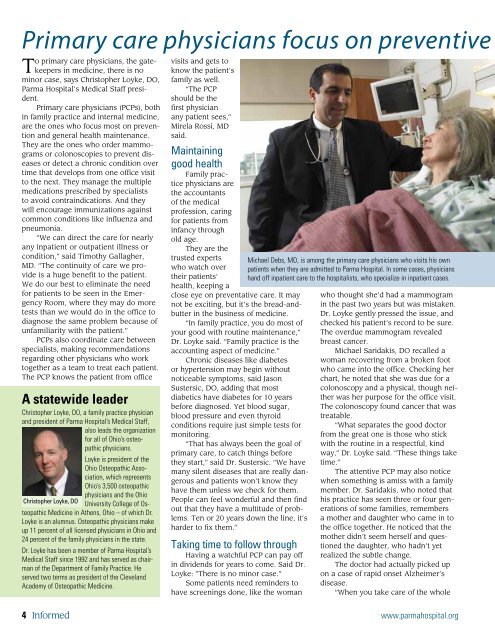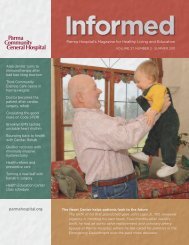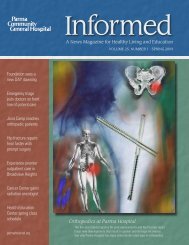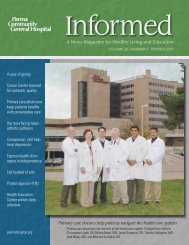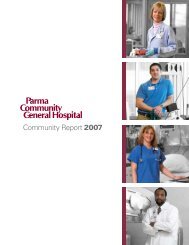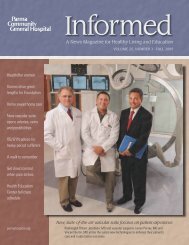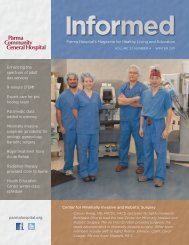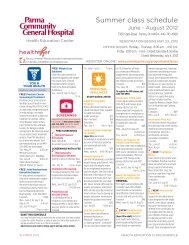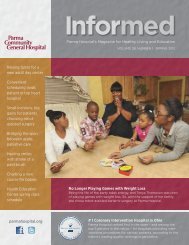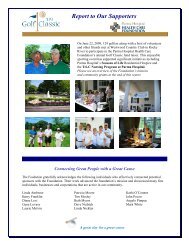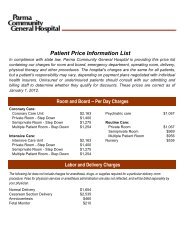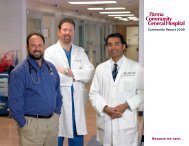Informed Magazine - Winter 2009.pdf - Parma Community General ...
Informed Magazine - Winter 2009.pdf - Parma Community General ...
Informed Magazine - Winter 2009.pdf - Parma Community General ...
Create successful ePaper yourself
Turn your PDF publications into a flip-book with our unique Google optimized e-Paper software.
Primary care physicians focus on preventive<br />
To primary care physicians, the gatekeepers<br />
in medicine, there is no<br />
minor case, says Christopher Loyke, DO,<br />
<strong>Parma</strong> Hospital’s Medical Staff president.<br />
Primary care physicians (PCPs), both<br />
in family practice and internal medicine,<br />
are the ones who focus most on prevention<br />
and general health maintenance.<br />
They are the ones who order mammograms<br />
or colonoscopies to prevent diseases<br />
or detect a chronic condition over<br />
time that develops from one office visit<br />
to the next. They manage the multiple<br />
medications prescribed by specialists<br />
to avoid contraindications. And they<br />
will encourage immunizations against<br />
common conditions like influenza and<br />
pneumonia.<br />
“We can direct the care for nearly<br />
any inpatient or outpatient illness or<br />
condition,” said Timothy Gallagher,<br />
MD. “The continuity of care we provide<br />
is a huge benefit to the patient.<br />
We do our best to eliminate the need<br />
for patients to be seen in the Emergency<br />
Room, where they may do more<br />
tests than we would do in the office to<br />
diagnose the same problem because of<br />
unfamiliarity with the patient.”<br />
PCPs also coordinate care between<br />
specialists, making recommendations<br />
regarding other physicians who work<br />
together as a team to treat each patient.<br />
The PCP knows the patient from office<br />
A statewide leader<br />
Christopher Loyke, DO, a family practice physician<br />
and president of <strong>Parma</strong> Hospital’s Medical Staff,<br />
also leads the organization<br />
for all of Ohio’s osteopathic<br />
physicians.<br />
Loyke is president of the<br />
Ohio Osteopathic Association,<br />
which represents<br />
Ohio’s 3,500 osteopathic<br />
physicians and the Ohio<br />
Christopher Loyke, DO University College of Osteopathic<br />
Medicine in Athens, Ohio – of which Dr.<br />
Loyke is an alumnus. Osteopathic physicians make<br />
up 11 percent of all licensed physicians in Ohio and<br />
24 percent of the family physicians in the state.<br />
Dr. Loyke has been a member of <strong>Parma</strong> Hospital’s<br />
Medical Staff since 1992 and has served as chairman<br />
of the Department of Family Practice. He<br />
served two terms as president of the Cleveland<br />
Academy of Osteopathic Medicine.<br />
visits and gets to<br />
know the patient’s<br />
family as well.<br />
“The PCP<br />
should be the<br />
first physician<br />
any patient sees,”<br />
Mirela Rossi, MD<br />
said.<br />
Maintaining<br />
good health<br />
Family practice<br />
physicians are<br />
the accountants<br />
of the medical<br />
profession, caring<br />
for patients from<br />
infancy through<br />
old age.<br />
They are the<br />
trusted experts<br />
who watch over<br />
their patients’<br />
health, keeping a<br />
close eye on preventative care. It may<br />
not be exciting, but it’s the bread-andbutter<br />
in the business of medicine.<br />
“In family practice, you do most of<br />
your good with routine maintenance,”<br />
Dr. Loyke said. “Family practice is the<br />
accounting aspect of medicine.”<br />
Chronic diseases like diabetes<br />
or hypertension may begin without<br />
noticeable symptoms, said Jason<br />
Sustersic, DO, adding that most<br />
diabetics have diabetes for 10 years<br />
before diagnosed. Yet blood sugar,<br />
blood pressure and even thyroid<br />
conditions require just simple tests for<br />
monitoring.<br />
“That has always been the goal of<br />
primary care, to catch things before<br />
they start,” said Dr. Sustersic. “We have<br />
many silent diseases that are really dangerous<br />
and patients won’t know they<br />
have them unless we check for them.<br />
People can feel wonderful and then find<br />
out that they have a multitude of problems.<br />
Ten or 20 years down the line, it’s<br />
harder to fix them.”<br />
Taking time to follow through<br />
Having a watchful PCP can pay off<br />
in dividends for years to come. Said Dr.<br />
Loyke: ”There is no minor case.”<br />
Some patients need reminders to<br />
have screenings done, like the woman<br />
Michael Debs, MD, is among the primary care physicians who visits his own<br />
patients when they are admitted to <strong>Parma</strong> Hospital. In some cases, physicians<br />
hand off inpatient care to the hospitalists, who specialize in inpatient cases.<br />
who thought she’d had a mammogram<br />
in the past two years but was mistaken.<br />
Dr. Loyke gently pressed the issue, and<br />
checked his patient’s record to be sure.<br />
The overdue mammogram revealed<br />
breast cancer.<br />
Michael Saridakis, DO recalled a<br />
woman recovering from a broken foot<br />
who came into the office. Checking her<br />
chart, he noted that she was due for a<br />
colonoscopy and a physical, though neither<br />
was her purpose for the office visit.<br />
The colonoscopy found cancer that was<br />
treatable.<br />
“What separates the good doctor<br />
from the great one is those who stick<br />
with the routine in a respectful, kind<br />
way,” Dr. Loyke said. “These things take<br />
time.”<br />
The attentive PCP may also notice<br />
when something is amiss with a family<br />
member. Dr. Saridakis, who noted that<br />
his practice has seen three or four generations<br />
of some families, remembers<br />
a mother and daughter who came in to<br />
the office together. He noticed that the<br />
mother didn’t seem herself and questioned<br />
the daughter, who hadn’t yet<br />
realized the subtle change.<br />
The doctor had actually picked up<br />
on a case of rapid onset Alzheimer’s<br />
disease.<br />
“When you take care of the whole<br />
4 <strong>Informed</strong> www.parmahospital.org


